Book contents
- Frontmatter
- Contents
- List of illustrations
- List of maps
- List of tables
- Acknowledgements
- Introduction
- 1 ‘The art of alchemists, sex and court ladies’
- 2 As the empire changed hands
- 3 ‘The age of calicoes and tea and opium’
- 4 ‘A hobby among the high and the low in officialdom’
- 5 Taste-making and trendsetting
- 6 The political redefinition of opium consumption
- 7 Outward and downward ‘liquidation’
- 8 ‘The volume of smoke and powder’
- 9 ‘The unofficial history of the poppy’
- 10 Opiate of the people
- 11 The road to St Louis
- 12 ‘Shanghai vice’
- Conclusion
- Notes
- Glossary
- Bibliography
- Index
Conclusion
Published online by Cambridge University Press: 05 June 2012
- Frontmatter
- Contents
- List of illustrations
- List of maps
- List of tables
- Acknowledgements
- Introduction
- 1 ‘The art of alchemists, sex and court ladies’
- 2 As the empire changed hands
- 3 ‘The age of calicoes and tea and opium’
- 4 ‘A hobby among the high and the low in officialdom’
- 5 Taste-making and trendsetting
- 6 The political redefinition of opium consumption
- 7 Outward and downward ‘liquidation’
- 8 ‘The volume of smoke and powder’
- 9 ‘The unofficial history of the poppy’
- 10 Opiate of the people
- 11 The road to St Louis
- 12 ‘Shanghai vice’
- Conclusion
- Notes
- Glossary
- Bibliography
- Index
Summary
Opium has had ‘a tenacious hold’ on China over the past five hundred years, with the exception of the thirty-year hibernation (1949–79). Since its epoch-making transformation, it has lived a social life unlike that of any other commodity. This book has set opium in its social and cultural contexts and has shown how the Chinese people developed a complex culture of consumption around its use. From the late fifteenth century up to the late twentieth century and indeed beyond, opium has been embedded in the changes that have taken place in China and also in its continuity. Mary Rankin, John K. Fairbank and Albert Feuerwerker believe that ‘efforts to find a simple progression or a single key to the dynamics of all this change founder in the face of the size and geographical diversity of the country, differences of local social organisation, and unevenness of development in different spheres’. This book calls such a statement into question. The social life of opium is a ‘simple progression’ and the ‘key’ that is opium allows us to understand many aspects of Chinese history from 1483 to 1999. No single paradigm, imperialism or China-centred, can single-handedly explain Chinese history; indeed, the story of opium reinforces this conviction. The introduction and naturalisation of opium smoking took both exogenous and endogenous forces. Chinese people of different classes, times and regions all contributed to the opium culture of consumption and to the institution that opium became.
- Type
- Chapter
- Information
- The Social Life of Opium in China , pp. 203 - 207Publisher: Cambridge University PressPrint publication year: 2005



